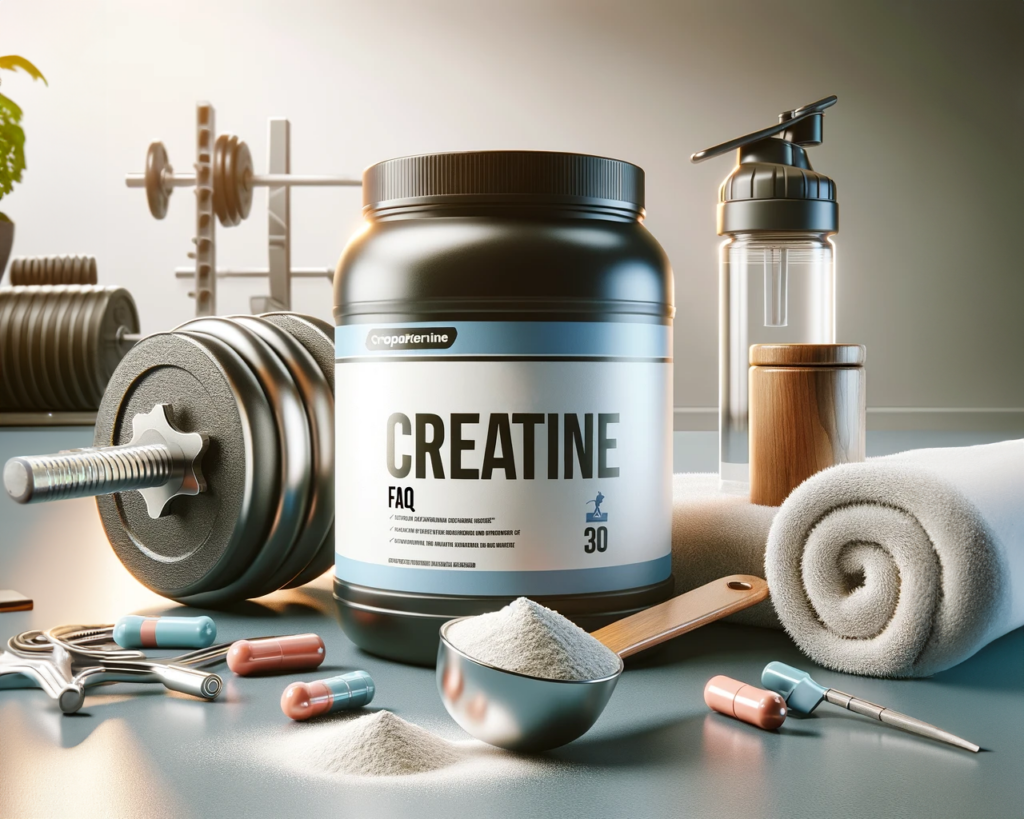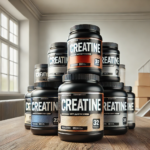
❓Common Questions and Misconceptions About Creatine
There have been over 500 scientific papers examining the side effects of creatine, including a comprehensive review in 2017 by the International Society of Sports Nutrition (ISSN) that looked at creatine’s effects on performance, recovery, and a complete safety profile. Despite abundant and clear research, a number of questions and misconceptions about creatine still remain, even among highly educated specialists. This article addresses some of the main conclusions from these studies.
👨🏽⚕️ Does Creatine Cause Kidney Damage?

When ingested at recommended dosages, creatine does not result in kidney damage or renal dysfunction.
The connection between creatine supplementation and kidney damage can be traced back to a poor understanding of creatine-creatinine metabolism and a case study published in 1998.
Creatinine Metabolism: About 1-3% of creatine in the body is naturally degraded to creatinine. This occurs whether creatine is endogenously produced or ingested through food or supplements. Creatinine has traditionally been used as a biomarker for kidney health, leading to concerns when creatinine levels increase due to creatine supplementation. However, these elevated levels do not reflect kidney damage.
The Case Study from 1998: This study involved a young man with existing kidney disease who took creatine along with several medications. The patient’s condition worsened, leading to concerns about creatine’s safety. However, subsequent studies have shown that creatine is safe and does not cause kidney damage.
Here are some of those studies:
- Safety of creatine supplementation – Subcell Biochem . 2007;46:275-89. doi: 10.1007/978-1-4020-6486-9_14.
- Effects of Creatine Supplementation on Renal Function: A Systematic Review and Meta-Analysis – J Ren Nutr. 2019 Nov;29(6):480-489. doi: 10.1053/j.jrn.2019.05.004
- In sickness and in health: the widespread application of creatine supplementation – Amino Acids . 2012 Aug;43(2):519-29. doi: 10.1007/s00726-011-1132-7
👴🏽👵🏽 Is Creatine Beneficial for Older Adults?

Creatine supplementation, particularly when combined with exercise, provides remarkable musculoskeletal and performance benefits in older adults. These benefits, in turn, have a compounding effect on wellness and longevity.
Supplementing with creatine can enhance functional abilities such as strength, daily activities, and fatigue resistance, as well as promote muscle mass among older adults. Existing literature suggests that relying solely on creatine intake without concurrent participation in a resistance training regimen is unlikely to yield significant increases in muscle strength and overall functional performance. Interestingly, even without exercise, creatine seems to show improvement in certain aspects of muscle fatigue.
Bone Health:
Creatine supplementation coupled with resistance training has been shown to enhance mineral content in aging bones and mitigate the effects of age-related sarcopenia. Bone loss and sarcopenia, both natural processes associated with aging, can significantly impact your health by increasing the risk of falls, fractures, and loss of independence.
Neuroprotective Properties:
Creatine helps shield brain cells from oxidative stress and inflammation, offering protective effects against neurodegenerative conditions like Alzheimer’s and Parkinson’s disease. More info here:
- Forbes SC, Cordingley DM, Cornish SM, et al. Effects of Creatine Supplementation on Brain Function and Health. Nutrients. 2022;14(5):921. Published 2022 Feb 22. doi:10.3390/nu14050921
💉💪🏽 Is Creatine an Anabolic Steroid?

No, creatine is an amino acid, not an anabolic steroid.
🧑🏽🦲 Does Creatine Cause Hair Loss/Baldness?

Evidence indicates that creatine supplementation does not cause hair loss or baldness. The misconception originates from a single study that showed an increase in dihydrotestosterone (DHT) levels, but subsequent research has not replicated these results or found significant changes in testosterone levels.
Here are some of those studies:
- The effects of creatine supplementation on performance and hormonal response in amateur swimmers. Science and Sports. 2011;26:272–277. doi: 10.1016/j.scispo.2011.07.003.
- Effects of short term creatine supplementation and resistance exercises on resting hormonal and cardiovascular responses. Science and Sports. 2015;30:105–109. doi: 10.1016/j.scispo.2014.03.006.
- Effect of creatine and beta-alanine supplementation on performance and endocrine responses in strength/power athletes. Int. J. Sport Nutr. Exerc. Metab. 2006;16:430–446.
💧 Does Creatine Lead to Water Retention?

In the short term, creatine can lead to increased water retention due to increases in intracellular volume. Over the long term, particularly relative to muscle mass, it does not alter intracellular or extracellular water volumes.
Here are some examples with the corresponding data to back it up:
- Andre et al. study: Male subjects engaged in resistance training and provided with creatine did not show any notable alterations in intracellular, extracellular, or total body water.
- Jagim et al. study: Resistance-trained men who ingested creatine supplements did not experience a substantial rise in intracellular water, extracellular body water, or total body water.
- Raqwson et al. study: Males and females ingesting creatine experienced no significant increase in total body water.
- Spillane et al. study: Non-resistance-trained males administered creatine supplementation did not exhibit noteworthy alterations in total body water.
⚡ Does Creatine Lead to Dehydration and Muscle Cramping?

There is no scientific support that creatine supplementation leads to dehydration and muscle cramping. In fact, creatine has been shown to reduce the frequency of muscle cramps and other related issues.
A study by Greenwood et al. monitored injury rates in Division IA NCAA collegiate football players and found that creatine users had significantly less cramping, heat illnesses and dehydration, muscle tightness, muscle strains, and total injuries compared to non-users.
Creatine monohydrate treatment alleviates muscle cramps associated with hemodialysis. Nephrol Dial Transplant . 2002 Nov;17(11):1978-81. doi: 0.1093/ndt/17.11.1978.
✅ Are Other Forms of Creatine Similar or Superior to Monohydrate?

Although certain variations of creatine might exhibit higher solubility, research consistently indicates that creatine monohydrate remains the most effective option. Other forms of creatine have lower physiological effects on intramuscular creatine reserves and performance.
🏃🏽♀️ Is Creatine Effective for Females?

Creatine supplementation is beneficial for females throughout their lives, with minimal adverse effects.
Creatine can provide benefits during pregnancy, reduce symptoms of depression, and improve muscle mass and strength in both younger and post-menopausal women.
Benefits of creatine for females:
- Guingand et al. study: Creatine could provide a safe, low-cost nutritional intervention for reducing intra- and post-partum complications.
- Kondo et al. and Hellem et al. studies: Increasing creatine concentrations in the brain as a result of supplementation may reduce symptoms of depression in females.
- Vandenberghe et al. study: Creatine supplementation during 10 weeks of resistance training significantly increased intramuscular concentrations, muscle mass, and strength compared to placebo in younger females.
- Post-menopausal women: Creatine supplementation in post-menopausal women during a resistance training program can improve muscle mass, upper- and lower-body strength, and tasks of functionality.
🐼 Does Creatine Increase Fat Mass?
C

reatine supplementation does not increase fat mass.
Randomized controlled trials have shown that while creatine might increase overall body mass, it does not alter fat mass.
Here are some examples:
- Silva et al. study: Creatine supplementation in swimmers or its combination with high-intensity interval training showed no alteration in body composition.
- Volek et al. study: Creatine supplementation during resistance training overreaching demonstrated no effect on fat mass.
- Forbes et al. meta-analysis: Creatine supplementation in older adults combined with resistance training revealed a bigger decrease in body fat percentage compared to those not taking creatine.
🚸 Is Creatine Harmful for Children and Adolescents?

Based on limited evidence, creatine supplementation appears safe and potentially beneficial for children and adolescents. Research has shown enhancements in fat-free mass, strength, and health outcomes in young patients with specific conditions.
Studies supporting safety in younger populations:
- Hayashi et al. study: Enhancements in pediatric patients with systemic lupus erythematosus.
- Tarnopolsky et al. study: Significant enhancements in fat-free mass and hand grip strength in pediatric patients with Duchenne muscular dystrophy.
- Sakellaris et al. study: Noteworthy improvements in traumatic brain injury-related outcomes among children and adolescents receiving oral creatine supplementation.
Creatine has been classified as generally recognized as safe (GRAS) by the FDA for older children and adolescents.
Summary
Creatine is a well-researched supplement with a robust safety profile and numerous benefits for various populations, including older adults and females. Misconceptions about creatine, such as its alleged effects on kidney damage, hair loss, and dehydration, have been debunked by scientific studies. Creatine monohydrate remains the most effective form of creatine, and its benefits extend to improving muscle mass, strength, and overall health. Whether for enhancing athletic performance or promoting long-term brain health, creatine supplementation offers a range of advantages without significant adverse effects.



